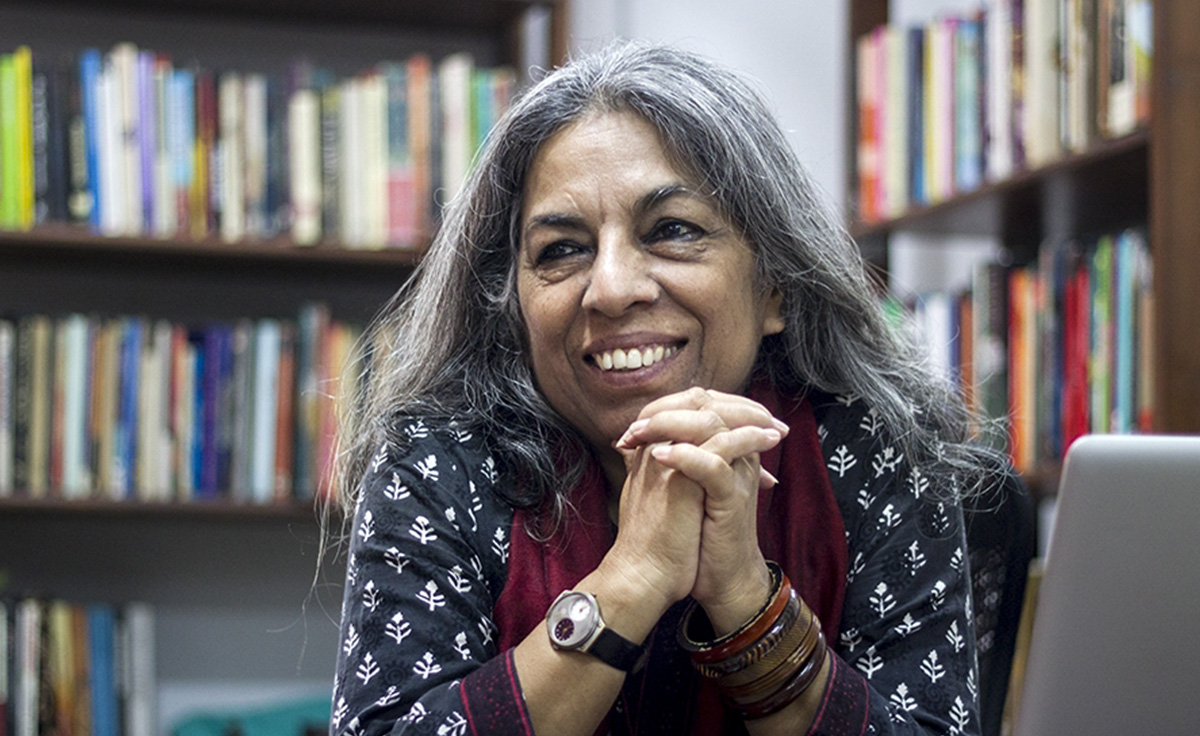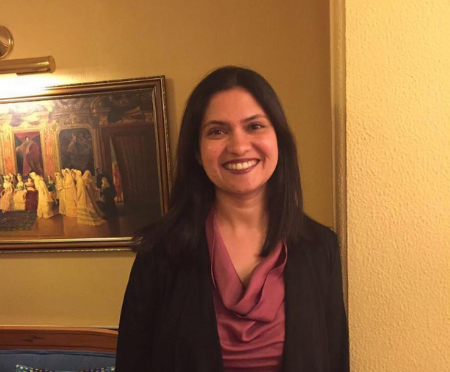I’m Urvashi Butalia, Founder of the feminist publishing house Zubaan Books, and this is how I Lead from Within
Urvashi Butalia is a publisher and writer. Co-founder of Kali for Women, India’s first feminist publisher, she is now CEO of the feminist publishing house Zubaan. With over 35 years of experience in feminist and independent publishing, she has a formidable reputation in the industry in India and abroad. She also has a long involvement in the women’s movement in India, and is a well-known writer, both in academia and in the literary world.
My Journey
I’m a publisher. I run a small feminist publishing house called Zubaan. It was set up in 1984, nearly 33 years ago, under another name. Originally it was Kali for Women, and it was run by two of us. In 2003 Ritu Menon, my business partner, and I split; we each set up our own business. It’s a feminist publishing house because we believe strongly in programming, center staging women’s writing.
I went into publishing completely by accident, I just was looking for a job that was not a teaching job and somebody asked me to come in and do some freelance work in publishing. Then I loved it, and I stayed there. I didn’t ever exit.
I set up Kali later to become Zubaan, because I saw this as a lack in the market. In the early 80s when the women’s movement was so strong and raising so many questions there was really no literature at all that could help those of us who were involved to understand what was happening around us. As a young person in publishing, I tried to talk to my boss just to see if they’d be interested in doing books by women about women. But they were not really interested; it had not occurred to them, they didn’t think those books were important, they didn’t think women had anything important to say. And so I just decided that alright, I will do it myself. And that was it, we kind of set up the publishing house in a very, very small way. Publishing the kind of books we do is not a hugely money making enterprise at all. But money and profit was never our motive. The motive was really much more political. Political in the sense of women’s rights and so on.
And so that’s what we did. We had no funds, so we set ourselves up as an NGO. We took some grants from the government, from international organizations and also farmed out our services as editors, as designers and earned some money back – which we put into the books we published. So we did what in India is known as jugaad, you know, just put things together and finding some money and going from book to book. And gradually it grew. When we started we basically had two books a year or something like that, and today we’re doing about 30-35 books a year and there is more than just the one publishing house. So clearly the market is growing. Women’s writing is not longer the same kind of marginalized space as it was then. Some ask me whether it’s time for us to fold up. I don’t think so because the starting point was making women’s voices heard and now we have to ensure that we make a variety of voices heard, not just upper middle class educated English speaking women but women from many languages, from many classes, from many castes and different ages, young and old women with visibilities and so on. I feel there’s a whole lot to be done.
On Representing Women
When we started we were what we believed, we still believe that we are the alternative voice to the mainstream which is by and large male dominated. We began by publishing books by women, but a lot of them were written by well educated urban English speaking women. And while that is important, it’s not by any means the entire reality of India. We were based in Delhi and our own professional capabilities were largely in English, so that kind of limited us. But we felt it was very important to go beyond that, and going beyond that meant going out consciously and looking for the kind of voices that are not heard, that are usually not paid attention to. It meant trying to see if one can get rural women in some ways; if they’re not writers perhaps by working with them, by listening to their stories and writing them down. If they’re not literate then working in a similar way. If they don’t write in English then doing the books in their own languages and translating. So just to make sure that we did not end up being elitist and limited, we selected at least a fraction of the very multiple realities of Indian women. We felt it was important to move beyond the city, move beyond the language English, move beyond the class of elite women and reach out to other types.
I’m happy that we have managed to do that. Even now, I’m currently talking to a group of women taxi drivers about writing their story. It’s not the kind of thing a mainstream publisher would do, they’re not interested; they would just go to some well known writer and publish them. But it’s what we do. One of our most successful books has been a book by a domestic worker about her life.
My Inspiration
To be able to read or hear the voices of women and be constantly surprised and humbled by the ways in which they’re thinking, the works they’re doing, the ways in which they survive has had a huge impact on me. The stories that we end up hearing as publishers, the ones that we publish, the ways in which our authors talk to us and tell us about their lives, it’s just so inspiring. For me that is the most important thing.
On Defying Stereotypes
You know, I think Indian society is actually much more flexible than we give the poor thing credit for in many ways.
I never decided not to have children or not to marry. It’s just something that didn’t happen. I didn’t feel the active desire for it, so if it didn’t happen I didn’t pursue it. And I have to say that I haven’t faced any major prejudice or anything like that -though I should qualify it by saying that I think partly it was because I was protected by my very supportive family. My parents never put pressure on me to get married or to have children. I mean, once they did say to me ‘why don’t you adopt a child?’ I just said why should I, they gave me a really compelling argument which was ‘just think what wonderful grandparents this child is missing out on.’ I thought that was quite lovely, and so for a while I started to think about it. But then I got too busy, and it didn’t really work out.
If I had not had my parents around, and if I had not had siblings who were supportive, it could have been much more difficult. There is also a funny thing about Indian society, when you cross a certain age line, and I don’t know exactly what that is, but at some point they stop and kind of respect the stance. I don’t know whether it has to do with what you’ve achieved professionally or what, but certainly I’ve never felt looked upon as the frustrated spinster. Which is good because I’m not that, I’m kind of a happy bachelor.
My Superpowers
Okay. See, I’m not an efficient worker, that’s not my strength, I’m a bit chaotic but I work hard. And I do manage to get things done, perhaps not in the best possible way but then I do. I like people and I work well with people and I think that that’s also a good thing in my kind of business.
I’m fairly direct; I’m not scared of saying it like it is. In the publishing business when you have to often say no to hopeful authors etc. it’s important not to hide behind excuses. It’s much better to be honest. I try to be honest with my authors, but I’m not hurtful or anything like that. And I think it offered me the greatest strength. I guess I absolutely love my work. I love doing what I do, and being direct makes it much easier to do.
My Words of Advice
First for young women, it’s important to dream. It’s absolutely essential to dream. Then I think, it’s important to believe in your dreams, and believe in your capabilities or capacities to do that. I mean, one of the biggest problems that we found when we started our publishing house was trying to convince women that what they had to say was important and that they needed to write in order for their voice to reach the world. They had no confidence in themselves to write because they had been kept out of the working world for so long. And this is something that is across the board, you know. Women’s self-confidence and esteem is often very low, and if I had any advice to give I’d say that you really have to believe in yourselves and that every one of you is pretty damn fantastic. And to do something, believe in yourself and that’s the first step. And then you move on and see what you can manage and what you can’t. But other than that, I don’t know. Everybody must make their own way in life and some of us are lucky to have support others don’t, and it’s very tough for them. One can be saying anything and offering any advice but if around you the context does not give you support then it’s really tough for you to move ahead. I think we have to recognize that. So I’m always reluctant to say this is the advice, but I think this much I would say that we really have to believe in ourselves and have high self esteem. That’s really important.
On Failure
If you play to your strengths, or at least know your weaknesses, then you can hold failure. If it comes, it has come out of all our lives. You fail at some things and you don’t fail at others. I’m quite philosophical about it. I don’t spend a lot of time agonizing. If it’s a failure I think okay, fine, that’s it, it’s done, let’s move on.
On Legacy
One can’t predict or hope that things will go a certain way in the future, especially institutions which are shaped very much by the vision of their founder. I think inevitably once that founder goes institutions change, because there will be new people, they will have new ideas. Also the context around the institution will change. I mean, feminism itself, the position of women, their literary world, all of these things are not static. So I don’t think that one can predict, want or desire a legacy. Though, it would be brilliant if Zubaan could survive into the future as a sustainable organization and something that retains the broad scope of feminism and feminist positioning. I can already see how Zubaan has changed so much since we started it. And I need to adapt to that change. Younger people are much more adaptive to what’s happening in their world. So I would rather leave it open, as long as we can ensure survival and ensure broad belief of our basic principles- let it take whatever shape it will. I mean, somebody might decide it’s no use doing a book publishing house, now let’s just do videos, art, who knows. So it can take any shape that way.


